Rodzina – szkoła – środowisko lokalne jako synergiczna przestrzeń socjalizacji
Family – School – Local Environment as a Synergic Space of Socialization
Author(s): Bożena MatyjasSubject(s): Education, Sociology, Social development, Family and social welfare
Published by: Uniwersytet Ignatianum w Krakowie
Keywords: family; school; local environment; socialization; synergy;
Summary/Abstract: RESEARCH OBJECTIVE: The aim of this article is the theoretical presentation of three educationally important areas of socialization for children and adolescents: family, school and the local environment. In addition, the indication of the synergic nature of the interactions of the listed components/agents as a sine qua non condition of the correct course of the socialization process, treated holistically and complementarily, is a significant objective of the article. Such an approach to the process of socialization is found in the environmental theory (social pedagogy), which indicates that many educational environments contribute to this process, which together should create/modify the space of socialization. THE RESEARCH PROBLEM AND METHODS: The research question was formulated in the form of the following questions: What is synergy of the family, school and the local environment as a socialization area? What is its importance in the proper course of socialization of children and youth? The research method used in the study was an analytical one and consisted of content analysis of literature on socialization and its determinants (sociological and pedagogical approach). THE PROCESS OF ARGUMENTATION: The concept of socialization, understood as a social space, is explained at the beginning of the article. Then, the family is characterized as a rudimentary space of socialization (primary), followed by spaces of secondary socialization: school and the local environment. The reflections show the synergic aspect of the distinguished spaces of socialization. The uniformity of environmental influences in the proper course of socialization of children and youth is indicated. RESEARCH RESULTS: The analysis focused on three upbringing environments important for children and young people, i.e. family, school, and the local environment, which all create a common space for socialization. It pointed out the need for cooperation/synergy of these components in the course of proper socialization of children and youth. CONCLUSION, INNOVATION AND RECOMMENDATIONS: The quality of socialization of children and adolescents is primarily determined by their family, followed by school and the local environment and resources offered by all of them. Cooperation of these environments creates a complementary and enriching environment, constituting a rich platform for life, education, and socialization. Therefore, the conclusions of the article should be addressed to all participants of children’s and adolescents’ socialization process.
Journal: Horyzonty Wychowania
- Issue Year: 16/2017
- Issue No: 38
- Page Range: 41-54
- Page Count: 14
- Language: Polish

